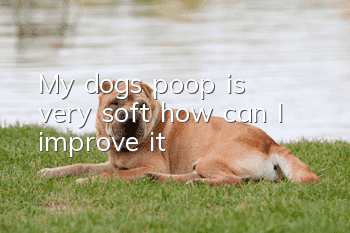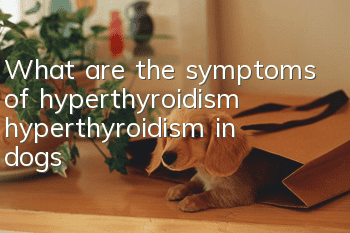My dog’s poop is very soft, how can I improve it?

Poop can reflect the health status of the dog, and pets should pay more and more attention to it. A healthy dog's poop should be moderately soft and hard, so when pet owners find that their dog's poop is soft, loose, or hard, it indicates that the dog has certain physical problems at the moment. Analyze the cause of soft stool and take appropriate measures in a timely manner to help the dog regain health.
Causes of soft stool
Transition period for food exchange. It is recommended to use one type of dog food on a fixed basis. If you want to change it, you need to change it gradually according to a certain proportion. If the dog has no adverse reactions after eating the new dog food for a period of time, it can be replaced with brand-new dog food. If meat is suddenly added to the pet's daily diet, it will also cause the dog's intestinal structure to adjust and cause soft stool.
Digestive system diseases such as enteritis and indigestion. Irregular daily diet, eating irritating, spoiled food, etc. can cause enteritis in dogs. When enteritis attacks, the main symptoms of dogs are soft stools, smelly stools with blood streaks, vomiting, fever, etc. If the owner discovers this situation, he needs to send the dog to the pet hospital in time.
Dogs who eat a lot and don’t exercise often, coupled with insufficient digestive enzymes, can easily cause indigestion. Dogs with indigestion will vomit and have loose stools, and in severe cases, they may have loose stools.
Parasite in the body. When a dog has parasites in its body, the dog will have soft stools, gradually lose weight, and may have blood or even small white worms in the stool. At this time, it is time to take the dog to do internal drive.
Diet Improvement
The above three conditions, enteritis and parasites all require professional veterinary treatment and deworming. However, dogs with soft stools during food changes or indigestion can be improved through diet.
The reason why you have soft stools for a short period of time after changing meat, or even severe diarrhea, may be similar in nature - they are both the result of the structural adjustment of intestinal bacteria. It's just that some adjustments went smoothly, while others were bumpy and bumpy, resulting in varying degrees of response.
Bacteria account for more than 95% of the cells in the entire intestine, which is the intestinal flora. We found that dogs eating dog food, canned food, and cooked meat will produce different compositions of intestinal bacteria, and if something goes wrong in this process, they will develop diarrhea.
The key to improving soft stools is bacterial diversity. For example, the intestine is a house, the intestinal bacteria are the pillars, and the diversity of the bacterial flora is the number of pillars. Changing diets often leads to the replacement of some "pillars". Naturally, the more pillars there are, the less likely the house will collapse when replacing the pillars. Appropriate pet diet ratio and exercise can increase the diversity of intestinal flora.
Don’t use probiotics blindly
Using bacterial probiotics is a bit of a gamble when faced with gut dysbiosis. At present, there are no reliable probiotics specifically for pets, and they are all sold as OEM products for humans. This creates a problem. It is difficult for pet owners to judge whether the probiotics you give are suitable for diarrhea. After all, these probiotics are designed for humans, and sometimes they can exacerbate the disorder.
Summary
Regular and quantitative feeding, scientific diet. Although soft stool is nothing to be alarmed about, pet owners should pay careful attention to avoid developing diarrhea. For pets whose diarrhea is not severe, they should be properly deprived of food for 6 to 10 hours, and given small amounts of water multiple times during this period.
- How to treat diarrhea in pregnant dogs?
- How many months should you start training a German Shepherd? The best time to train a German Shepherd!
- When is the best month to train a Lala? The best age to train a Lala!
- Why are fewer and fewer people raising Papillon dogs? These 5 reasons must be mentioned!
- Things to note when raising a Russian Wolfhound
- Flat-coated Retriever personality and appearance traits
- 10 health warning signs for dogs
- My dog's throat seems to be stuck after bathing him
- What is Senior Dog Syndrome? What does the owner need to do?
- Pets maintain a good appetite, these mysterious elements are indispensable



